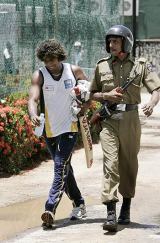What is good for the goose is not good for the gander
Some will rightly ask whether South Africa would have pulled out of a tour to Australia or England in similar circumstances?
Osman Samiuddin
16-Aug-2006
|
|

|
It is easy to criticise South Africa's decision to pull out of the Colombo tri-series. People can cite the case of Australia. In 2002 they refused to tour Pakistan because of the 'war on terror' yet three years later continued their Ashes tour of England despite the July 7th terrorist attacks; some will rightly ask whether South Africa would have pulled out of a tour to Australia or England in similar circumstances?
Australia and England both stressed last summer that such attacks should not disrupt normal life. A similar and more robust argument can be made here, especially as the blast was unrelated to a broader 'war on terror' and instead part of a local, long-running conflict. Given the modern world's increasing polarization, it is easy to spot double standards in that sort of behaviour.
Many will also insist that no place in the world is really safe anymore, from any kind of violence. Can foolproof security be offered anywhere? Johannesburg is a dangerous city, as Saqlain Mushtaq and Mohammad Wasim found out on the 1997-98 tour when they were attacked and mugged, putting the tour briefly in doubt and delaying the first Test. Pakistan are playing a Test in London days after a major terrorist plot at the country's leading airport, in a country which is still on a high level of alert. How safe are they?
But any criticism of South Africa's decision should also be tempered, to an extent, by the understanding that safety is a very personal concept. A Pakistani player's notion of safety is likely to be different to that of a South African. If he is a resident of Karachi, he will have few qualms in traveling to Delhi, Mumbai or Colombo because he is likely to be more immune to such incidents. Tragic as they are, because they happen regularly enough in his city, they build up a certain resistance. The same can be said of a player from Colombo, Delhi or Mumbai; unsurprisingly, since 9/11 the only countries to play a Test in Karachi are the three teams from the subcontinent.
The stance of the forgotten party in all this - India - confirms this. By choosing to stay on, we can assume that the incident hasn't affected them as much as it has South Africa. Even if it is because, as some suggest, they feel compelled to do so with Mumbai - another recently terrorist-hit venue - due to host a Champions Trophy final soon, and if they felt a sense of real danger, they might have made some noises.
Should we expect players from the West Indies, Australia, New Zealand and South African to hold the same notions of safety? May be not. Whether it is a fight for freedom or terrorism, homegrown or international, it has not afflicted those countries as much as it has this region. They are not used to such incidents on as regular a scale and thus likely to react differently. Further, their perceptions of the region may indeed be misplaced but when they concern as basic a concept as safety and self-preservation, they can also be rigid.
But given that the subcontinent constitutes such an important bloc in the cricketing world, we should expect from them, at the very least, an awareness of local complexities and cultures, and thus be in a position to make informed decisions in such situations. If South African players were au fait with the nature of the local conflict in which foreign cricket teams, historically, are an unlikely target, they might not have been so eager to leave. Although not half as ridiculous, their departure leaves them open to accusations of the kind of ignorance England displayed when they dithered over touring India in 2001, in the absurd belief that the country was a security threat after 9/11.
Clearly something needs to be done for this isn't the first time it has happened in Sri Lanka. In April 1987, a bomb blast in Colombo forced New Zealand to pack their bags and head back. New Zealand was affected again, five years later in November 1992, when another blast curtailed their tour and saw some players returning home (uncannily, New Zealand were also touring when a bomb in Karachi cut short a tour in May 2002). Australia and West Indies famously refused to play their World Cup games in 1996 in Colombo. And South Africa have also been previously affected; in 2003 they refused to play in Karachi and Peshawar, after a bomb blast in the port city. Not many will bet that it is the last time either.
For once, Pakistan and India can adopt the moral high ground and show the way. In 1998-99, Pakistan were due to visit India for their first tour in 12 years and security concerns, in light of threats from extremist groups, dominated the build-up. Similarly, before the 2003-04 tour to Pakistan, many Indian players were wary of crossing the border, especially so soon after an attempt on Pervez Musharraf's life. And because of their unique history, both sides were more at threat than any touring team in recent time. Ultimately, both tours went ahead, destroying myths, shattering perceptions and enhancing ties. A uniform display of that will from the cricket community would be admirable.
Osman Samiuddin is Pakistan editor of Cricinfo